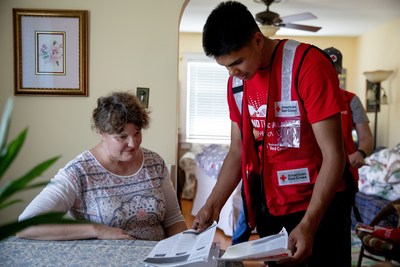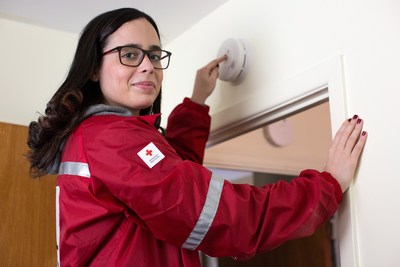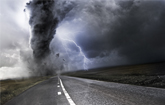WASHINGTON, May 23, 2018 /PRNewswire-USNewswire/ -- Over the course of just a few weeks in April and May, more than 30,900 volunteers and thousands of partners from across the country joined the American Red Cross to Sound the Alarm against home fires by installing 103,400 free smoke alarms in communities at high risk for fires.



"We are so grateful for everyone who contributed to the success of this inaugural lifesaving effort," said Gail McGovern, President and CEO of the Red Cross. "With the help of our volunteers, partners and donors, we surpassed even our own highest expectations by making 43,000 homes safer across 120 major cities in the United States."
One of these homes was in Dubuque, Iowa, where a family of seven was able to escape from a fire in their mobile home this week – just weeks after smoke alarms were installed. Red Cross volunteers and partners from the Key West Fire Department and Church of Latter Day Saints visited the home on April 28, installing free smoke alarms and helping to create a fire escape plan. On May 17, the homeowner was awakened by the sound of the new smoke alarms going off and saw smoke and flames inside the home. He was able to get his family out safely and call the fire department. The Red Cross assisted the family after the fire, who said the fire escape plan prepared them to escape quickly.
Every day, seven people are killed and another 36 are injured because of home fires. Tragically, most of these deaths occur in homes that don't have working smoke alarms. Sound the Alarm is part of the multi-year Red Cross Home Fire Campaign, launched in 2014 to reduce the number of home fire deaths and injuries in this country by 25 percent. Since 2014, Red Cross volunteers and partners have installed more than 1.2 million smoke alarms and reached more than a million children through preparedness programs.
"Our Home Fire Campaign is already credited with helping to save 431 lives," McGovern reported. "And this is just the beginning. We will build on our collective success and continue to reach more families and communities with lifesaving preparedness information in the months and years ahead."
This work was made possible thanks to generous financial donations from national partners: Almost Family, Delta Air Lines and International Paper.
In a typical year, home fires kill more people in the United States than all other natural disasters combined. They are the most common disaster people face in this country – and are the majority of the nearly 64,000 disasters the Red Cross responds to every year. However, a recent Red Cross survey showed most people are overconfident and underprepared when it comes to home fire safety. The details of this survey are available here.
WHAT YOU CAN DO To help save lives, the Red Cross is asking every household in America to take two simple steps:
- Practice fire drills at home. Fire experts agree that people may have as little as two minutes to escape a burning home and the Red Cross urges every household to create a fire escape plan and practice it until everyone can escape in less than two minutes.
- Check smoke alarms monthly. Working smoke alarms cut the risk of dying in a home fire in half. Place smoke alarms on every level of your home, including inside and outside bedrooms. Test smoke alarms once a month. Change the batteries at least once a year, if your model requires it.
About the American Red Cross:
The American Red Cross shelters, feeds and provides emotional support to victims of disasters; supplies about 40 percent of the nation's blood; teaches skills that save lives; provides international humanitarian aid; and supports military members and their families. The Red Cross is a not-for-profit organization that depends on volunteers and the generosity of the American public to perform its mission. For more information, please visit redcross.org or cruzrojaamericana.org, or visit us on Twitter at @RedCross.
SOURCE American Red Cross
Related Links
WANT YOUR COMPANY'S NEWS FEATURED ON PRNEWSWIRE.COM?
Newsrooms &
Influencers
Digital Media
Outlets
Journalists
Opted In






Share this article